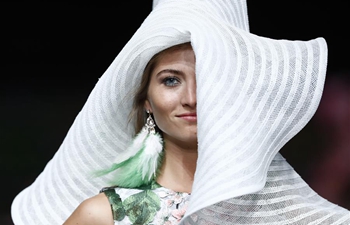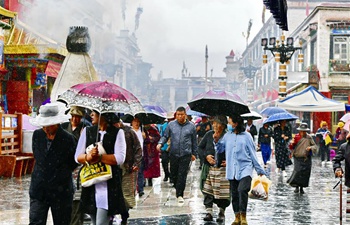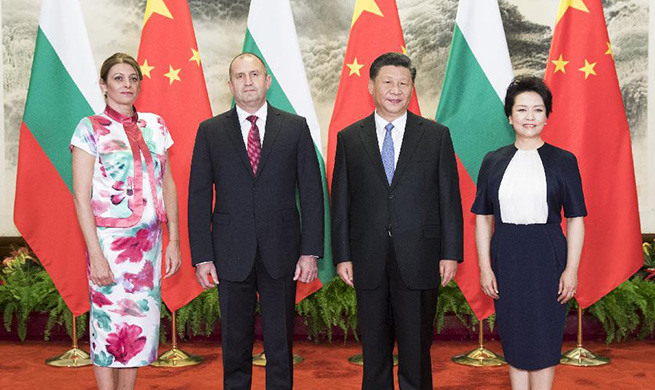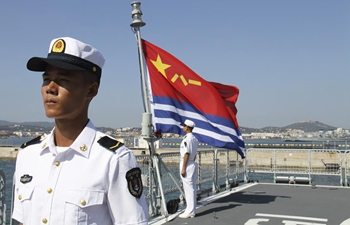ROME, July 3 (Xinhua) -- Italian analysts on Wednesday showed mixed reactions to the nomination of the top leaders of the European Union (EU). At the same time, they overall welcomed the election of an Italian former journalist as new president of the European parliament.
On Tuesday, after tough negotiations, the EU leaders agreed to nominate German defense minister Ursula von der Leyen as next chief of the European Commission, elect Belgian prime minister Charles Michel as next president of the European Council, and nominate French Christine Lagarde -- managing director of the International Monetary Fund (IMF) -- as new head of the European Central Bank (ECB).
Spain's foreign minister Josep Borrell was appointed as EU's new high representative for foreign affairs.
According to several observers here, such outcome showed the strategy Italy chose to negotiate with EU's major partners and political forces proved ineffectual.
BOOST FOR PRO-EUROPEANS
"Now Italy means less," headlined Turin-based La Stampa newspaper.
"Nationalists and populists have proved wrong, the May 26 (European parliament) vote did not wipe out the 'Old Europe'," wrote analyst Marco Zatterin.
"From the tortuous negotiations on the hottest armchairs on the continent has emerged a tired Union, but nonetheless it is a Union consistent with its past and its ambitions."
"This results from an alliance that has finally put two relevant women on top, and that was designed by a deal between the usual Franco-German cooperation and the four alleged 'rebels' of Visegrad group (Czech Republic, Slovakia, Hungary, and Poland)," said Zatterin.
"Now, Berlin will lead the Commission, which has not happened since 1967, (French President) Emmanuel Macron can go home smiling, after having aimed straight at the ECB... and Spanish (Prime Minister Pedro) Sanchez has gained weight as negotiator," the analyst noted.
"So the moral of the story is clear: all those who have played for Europe have won."
On the contrary, according to him, Italy would have played "a contradictory strategy".
"Prime Minister Conte has negotiated with passion, but he has paid for his depending upon confused and discordant shareholders (Italy's two coalition parties, League and Five Star Movement, both Eurosceptic)," Zatterin stressed.
Italy's major business daily Il Sole 24Ore described the nominations to EU's top jobs as a "victory of Macron and Merkel".
"Emmanuel Macron's strategy has prevailed, and Angela Merkel was in the game," Giuseppe Chiellino wrote.
"The nomination of Dutch socialist (Frans) Timmermans submitted to partners in Osaka (during the G20 Summit) turned out to be a refined tactic to place Ursula von der Leyen -- Merkel's political heir -- as head of the Commission," the analyst explained.
"The Visegrad Group's countries, which Italy has joined, have fallen into the trap and, after saying no to Timmermans, have been unable to oppose Merkel's candidate."
Conservative daily Il Corriere della Sera said latest nominations would prove an intergovernmental approach -- based on the strength of single member states -- prevailed once again at the expense of a more democratic way to select the EU's top jobs.
"In this substantial general failure, Italy also loses on its own," Antonio Polito wrote.
The senior analyst noted that Italy would "lose" Mario Draghi at the presidency of the ECB -- "and only time will tell how much we are going to regret him", he stressed -- and Federica Mogherini as High Representative for the EU's foreign affairs.
"Now we can only hope our member of the Commission will be given a relevant economic portfolio," Polito said.
SASSOLI'S ELECTION WELCOMED
Analysts reacted more positively after David Maria Sassoli -- a former journalist and a Socialist MEPs -- was elected as new president of the European Parliament on Wednesday.
Among the first to congratulate among officials was Italian president Sergio Mattarella.
"The high responsibility entrusted to you by lawmakers of the Union's countries is proof of the broad trust placed upon you as a person, and a recognition for your constant and fruitful commitment to European institutions," Mattarella told Sassoli in an official message.
"Center-leftist David Sassoli replaces another Italian, center-right Antonio Tajani," headlined Il Sole 24Ore.
The business daily explained Sassoli "will set timing and contents of the European parliament (debate), he will have control powers on the executive, and will be able to co-decide over the EU budget, and ultimately address the new Europe".
Conservative newspaper Il Giornale observed that "the representative of (Italy's center-left) Democratic Party... will lead the European assembly after Tajani, but this is no victory for the Italian government".
The daily specified Sassoli's election was indeed "a sign that Italy will keep a top position in the European institutions".
Yet, it added, it could not be seen as a direct success for Prime Minister Giuseppe Conte's center-right government, because Sassoli was not at all close to the cabinet in terms of political stance.
"Italy has indeed obtained a senior position in Strasbourg, but one that is completely disconnected from the logic of the government currently leading the country," Il Giornale stressed.













